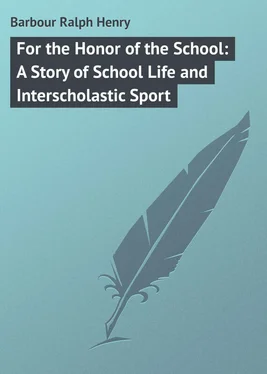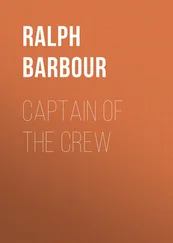Ralph Barbour - For the Honor of the School - A Story of School Life and Interscholastic Sport
Здесь есть возможность читать онлайн «Ralph Barbour - For the Honor of the School - A Story of School Life and Interscholastic Sport» — ознакомительный отрывок электронной книги совершенно бесплатно, а после прочтения отрывка купить полную версию. В некоторых случаях можно слушать аудио, скачать через торрент в формате fb2 и присутствует краткое содержание. ISBN: , Жанр: foreign_prose, foreign_children, на английском языке. Описание произведения, (предисловие) а так же отзывы посетителей доступны на портале библиотеки ЛибКат.
- Название:For the Honor of the School: A Story of School Life and Interscholastic Sport
- Автор:
- Жанр:
- Год:неизвестен
- ISBN:http://www.gutenberg.org/ebooks/47974
- Рейтинг книги:5 / 5. Голосов: 1
-
Избранное:Добавить в избранное
- Отзывы:
-
Ваша оценка:
- 100
- 1
- 2
- 3
- 4
- 5
For the Honor of the School: A Story of School Life and Interscholastic Sport: краткое содержание, описание и аннотация
Предлагаем к чтению аннотацию, описание, краткое содержание или предисловие (зависит от того, что написал сам автор книги «For the Honor of the School: A Story of School Life and Interscholastic Sport»). Если вы не нашли необходимую информацию о книге — напишите в комментариях, мы постараемся отыскать её.
For the Honor of the School: A Story of School Life and Interscholastic Sport — читать онлайн ознакомительный отрывок
Ниже представлен текст книги, разбитый по страницам. Система сохранения места последней прочитанной страницы, позволяет с удобством читать онлайн бесплатно книгу «For the Honor of the School: A Story of School Life and Interscholastic Sport», без необходимости каждый раз заново искать на чём Вы остановились. Поставьте закладку, и сможете в любой момент перейти на страницу, на которой закончили чтение.
Интервал:
Закладка:
“What’s the matter, Don? Are you hurt?” he cried anxiously.
There was no answer, and he leaned down and drew a bare arm from before a face whereon the tears were trickling.
“Keep the fellows away, Paddy,” whispered Don huskily. “I’ll – be all right – in a minute. I – I – my ankle’s sprained, I guess; I can’t run – a step; and – and, oh, Paddy, we’ve lost the race!”
CHAPTER II
WHAT A LAUGH DID
A few minutes later Don was sitting in a corner of the grand stand, smothered in a pile of blankets and with his injured ankle bound in wet bandages. Beside him were two boys of about his own age, one of whom, the lad whom he had addressed as Paddy, was solicitously slopping cold water from a tin can over his ankle at frequent intervals. Nothing serious, Professor Beck had decided, only a strained tendon; and so Don had been helped to his present position, from where he could watch the race run out. He looked pale and woe-begone; but he managed to smile now and then in answer to Paddy’s sallies.
“Paddy” Breen – his real name was Charles – had been given his nickname two years before, when he was a little red-headed junior too small to resent it had he been so inclined. Paddy’s forbears had been Irish a generation or two back, and although there was little about the boy to suggest the fact, barring his red hair and gray eyes and sunny nature, the name was somehow distinctly appropriate, and it had stuck to him through his junior and lower middle years and promised to stick forever. Paddy played center on the first eleven, a position for which his broad shoulders and hips and great strength eminently fitted him. To-day he was attired in a faded and torn red sweater, a pair of equally disreputable moleskin trousers, two red and black striped stockings whose appearance told a story of many battles, a pair of badly scuffed tan shoes, and a golf cap of such bold and striking tones of brown, green, and scarlet as to stamp it at once as brand-new.
The lad who sat on the other side of Don was of even more generous build than Paddy Breen. Dave Merton’s shoulders were broad and set well back, giving him a look of great power. He was, perhaps, the least bit overgrown for his seventeen years, for he topped Paddy by an inch and Don by two. But he looked very healthy and happy, and was as good-natured a fellow as any at the Academy. His hair was black and his eyes dark, giving him a more somber coloring than his bosom companion, Paddy, but, like the latter, he preferred smiling to frowning. Dave had two great ambitions in life at present – namely, to throw the hammer farther than any other Hilltonian and to excel at study. The latter seemed quite within the range of possibility, but as for Dave’s hammer throwing it was a school joke at which even Dave could laugh. Paddy Breen was a brilliant pupil; Dave Merton a hard-working one. Paddy was an excellent football player; Dave an indifferent performer with the weights. Both were leaders in their classes – Dave was a senior – and popular throughout the school. Their friendship was as much a joke as Dave’s hammer throwing and the two were inseparable.
“Beaten?” Paddy was saying scornfully. “Never, me boy. Sure ’tis only beginning we are; just wait till we git our breath!” Paddy, as though to lend indorsement to his nickname, at times dropped into a brogue acquired with great labor from such classics as Charles O’Malley and Tom Burke.
“I only wish we had begun earlier in the race, Paddy,” answered Don hopelessly. “Who is ahead in the bunch there, Dave – can you make out?”
The leaders, House and Beaming, were now far up the course and the next group of runners were some distance behind. Farther back of them other contestants straggled. Two runners were out of the race. A Shrewsburg boy had given up on the second round and was philosophically watching the contest from the top of a distant bank, and a Hillton fellow, Turner, had gone to the dressing room suffering with an attack of cramp. In answer to Don’s question Dave studied the distant runners for a space in silence.
“Well, that’s Northrop in the lead all right, Don, and the next two fellows are St. Eustace men. Then Moore and a Shrewsburg chap, and another St. Eustace man, and – and one of our team – I can’t make out who.” Dave looked frowningly across the field.
“Which one?” asked Paddy. “The fellow with the long legs just taking the hedge? Why, man, that’s Wayne, of course; no mistaking him.”
“So it is,” answered Don. “He’s doing well. It would be queer if he managed to keep his present place and got in third, wouldn’t it?”
“Well, he won’t,” said Dave, “for Jones has passed him. Good old Jones! Just look at him spurt!”
“Those two men just behind Northrop are Keller and Gould, of St. Eustace,” said Don. “Well, I guess we’re dished. House and Beaming are sure of first and second place; Northrop ought to get third; then either Gould or Keller is pretty certain to finish ahead of Moore – perhaps both will; that would make the score something like twelve to twenty-four, supposing we got three men in after Keller and Gould.”
“There’s a good half mile to cover yet, my lad,” said Paddy cheerfully. “There’s lots may happen in that distance. Look there; those fellows are changing all around. And, by Jove, fellows, look at Beaming!”
Beaming was dropping back and House was alone at the turn of the course. And some one – it seemed as though it must be Northrop, of Hillton – was closing up the long gap between the leaders and the next group at a fabulous pace. And even as the three boys on the grand stand strained their sight a second runner left the group as though it were standing still and shot after Northrop – if it was Northrop. The runners were too far off to allow of the watchers being certain as to their identity, but a look of hope crept into Don’s face. There seemed nothing to do save wait until the runners appeared at the railroad a third of a mile away, until Paddy spied a pair of field glasses in the hands of a boy in the throng below and unceremoniously gained possession of them. He passed them to Don, and the latter, leaning for support on Dave and Paddy, swept the course with them.
“Northrop’s ahead of Beaming!” he cried. “And Jones is almost up to him! House is leading by forty yards or more! A Shrewsburg fellow is running even with Keller and Gould! Paddy, we’ve still got a show!”
“Where’s Wayne?” asked Dave.
“And Jones?” asked Paddy.
“Wayne? I – can’t – see him. Hold on; yes, there he is! He’s at the back of the bunch; a Shrewsburg fellow’s passing him hand over fist. Jones is gaining, Paddy; he’s creeping up. There they go over the bank jump. Some fellow’s done up – it’s Keller; Jones has passed him.” Don excitedly turned his glasses toward a point nearer home. “House still leads and is spurting, hang him! Northrop’s fifty yards behind him, and Beaming – no, fellows, it’s Moore! Moore’s in third place!”
“What?” cried Dave. “What’s up with Beaming?”
“Don’t know; he looks tuckered. Hello!”
“What is it, Don? Talk out; don’t be so plaguey slow!”
“A Shrewsburg chap has gained fifth place and looks as though he were going to beat Beaming in the next twenty yards. What do you think of that? Jones and Wayne are both gaining. By Jove, fellows, we may get it yet! Let’s go down to the finish; help me down, Dave.”
“If only Jones and Wayne can last,” said Paddy, “we could win, couldn’t we? But Wayne – ” Paddy shook his head as they descended from the stand and went toward the finish line. “Do you think he can hold out, Don?”
Don shook his head dubiously.
Читать дальшеИнтервал:
Закладка:
Похожие книги на «For the Honor of the School: A Story of School Life and Interscholastic Sport»
Представляем Вашему вниманию похожие книги на «For the Honor of the School: A Story of School Life and Interscholastic Sport» списком для выбора. Мы отобрали схожую по названию и смыслу литературу в надежде предоставить читателям больше вариантов отыскать новые, интересные, ещё непрочитанные произведения.
Обсуждение, отзывы о книге «For the Honor of the School: A Story of School Life and Interscholastic Sport» и просто собственные мнения читателей. Оставьте ваши комментарии, напишите, что Вы думаете о произведении, его смысле или главных героях. Укажите что конкретно понравилось, а что нет, и почему Вы так считаете.












